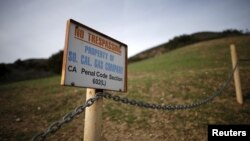California’s air quality board voted unanimously Thursday to approve methane regulations touted as the strictest adopted in the United States for controlling emissions of the second-most prevalent greenhouse gas in the atmosphere.
The rules, approved by the California Air Resources Board, tighten efficiency requirements for production and transportation of natural gas and for some oil-handling equipment, including installation of emissions-recapture technology.
They also mandate more stringent monitoring and reporting of potential gas leaks as a means of pinpointing and repairing them quickly.
Methane traps more heat
Methane, the main component of commercially distributed natural gas, is also a byproduct of oil extraction. Pound for pound, it traps significantly more heat in the atmosphere than carbon dioxide, the most prevalent greenhouse gas, though its effects are shorter-lived.
The 14-member board announced its approval of the methane rules at the end of a daylong meeting in Riverside, California, east of Los Angeles.
The action comes more than a year after a massive methane leak at the Aliso Canyon gas storage field, owned by the Southern California Gas Co, forced thousands of residents from their homes in the nearby Porter Ranch community of Los Angeles.
The well rupture that caused the leak, the largest known accidental methane release in U.S. history, took nearly four months to plug and was estimated to have had a larger climate impact than the 2010 Deepwater Horizon oil spill in the Gulf of Mexico.
EPA cut, states act
Thursday’s vote came shortly after President Donald Trump proposed major cuts to the Environmental Protection Agency’s budget and as the U.S. Senate prepared to vote on repealing a rule limiting methane venting and leaking on federal lands.
Environmental Defense Fund director Tim O’Connor, whose group helped devise the state regulations, said California’s action was all the more important in light of the Trump administration’s vow to curb EPA regulations.
“If the federal government won’t protect the people and the environment from oil and gas pollution, it has to be up to the states,” he said.
Because methane is relatively cheap, economic incentives for producers to prevent and fix accidental leaks are small, said Steve Weissman, a lecturer at the University of California at Berkeley who specializes in energy law and policy.
Sabrina Lockhart, a spokeswoman for the California Natural Gas Producers Association, expressed reservations about the proposal Wednesday, and said industry concerns have centered on requirements for continued inspections, even for facilities with strong maintenance records, and inspection costs.






